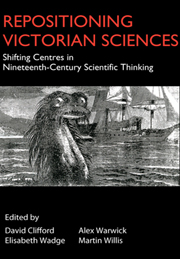Book contents
- Frontmatter
- Contents
- Notes on Contributors
- 1 Margins and Centres
- SECTION I Shifted Centres
- SECTION II Contested Knowledges
- SECTION III Entering The Modern
- 13 Fresnel's Particular Waves: Models of Light as Catalytic Modes of Worldmaking in Early Modern Times
- 14 Re-imagining Heaven: Victorian Lunar Studies and the Anxiety of Loneliness
- ‘You Should Get Your Head Examined’: Freudian Psychoanalysis and the Limits of Nineteenth-Century Science
- 16 Scholars, Scientists and Sexual Inverts: Authority and Sexology in Nineteenth-Century Britain
- 17 Unmasking Immorality: Popular Opposition to Laboratory Science in Late Victorian Britain
- Notes
- Select Bibliography
13 - Fresnel's Particular Waves: Models of Light as Catalytic Modes of Worldmaking in Early Modern Times
from SECTION III - Entering The Modern
Published online by Cambridge University Press: 05 March 2012
- Frontmatter
- Contents
- Notes on Contributors
- 1 Margins and Centres
- SECTION I Shifted Centres
- SECTION II Contested Knowledges
- SECTION III Entering The Modern
- 13 Fresnel's Particular Waves: Models of Light as Catalytic Modes of Worldmaking in Early Modern Times
- 14 Re-imagining Heaven: Victorian Lunar Studies and the Anxiety of Loneliness
- ‘You Should Get Your Head Examined’: Freudian Psychoanalysis and the Limits of Nineteenth-Century Science
- 16 Scholars, Scientists and Sexual Inverts: Authority and Sexology in Nineteenth-Century Britain
- 17 Unmasking Immorality: Popular Opposition to Laboratory Science in Late Victorian Britain
- Notes
- Select Bibliography
Summary
Introduction: Visual Worldmaking
Leading, primarily, a visual existence, man's main orientations are focused on light and perception of light. The optical channels of a human being are superior to the rest of his sensory inputs, as long as quantity and complexity of data are under question. With regard to linguistic design, metaphors of light hold an eminent position in human discourse, connected especially to fields of knowledge, learning, moral quality and aesthetic perfection. As a consequence, they stand out in all ideological terrains of human self-constitution, concerning basic religious concepts, their narrative transformations as well as rationalistic sublimations of these models, during modernity's development towards the age of enlightenment.
This essay deals with the interrelationship between scientific–especially physical–theories and the ideological groundwork of a given culture. Centring on influences emerging from pre-formal concepts of reality, the problem will be raised if any explicit physical theory will succeed in keeping a constitutive distance from such pre-scientific forms of worldmaking. It will need to be asked if modern quantifying approaches to nature fall under the clandestine seizure of intersubjective and intracultural dynamics, importing a basic matrix of anthropomorphic worldmaking into those formal and quantified versions of reality we use to call sciences.
Complying with such a project gives good reasons to keep a secure distance from positions which take the social construction of all forms of reality and worldmaking for granted. It is not the structuring idea of this paper to underline the presumable irrelevance of scientific hopes for objective truths – a tendency one might call ‘epistemic relativism’.
- Type
- Chapter
- Information
- Repositioning Victorian SciencesShifting Centres in Nineteenth-Century Thinking, pp. 157 - 170Publisher: Anthem PressPrint publication year: 2006



